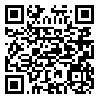Volume 11, Issue 1 (5-2019)
2019, 11(1): 90-95 |
Back to browse issues page
Clinical trials code: IRCT20171211037830N2
Download citation:
BibTeX | RIS | EndNote | Medlars | ProCite | Reference Manager | RefWorks
Send citation to:



BibTeX | RIS | EndNote | Medlars | ProCite | Reference Manager | RefWorks
Send citation to:
Nasiri M, Sobhani Shahmirzadi M. Comparison of the Effect of Single and Twice Daily Administration of Ranitidine in Relief of Morning Abdominal Pain and Nausea in Children referred to Gastroenterology Clinic of Taleghani Children Hospital in 2017. North Khorasan University of Medical Sciences 2019; 11 (1) :90-95
URL: http://journal.nkums.ac.ir/article-1-1734-en.html
URL: http://journal.nkums.ac.ir/article-1-1734-en.html
1- Neonatal and Children’s Health Research Center, Golestan University of Medical Sciences, Gorgan, Iran
2- Associate Professor, Pediatric Gastroenterologist, Neonatal and Children’s Health Research Center, Golestan University of Medical Sciences, Gorgan, Iran , Sobhani_shahmirzadi@yahoo.com
2- Associate Professor, Pediatric Gastroenterologist, Neonatal and Children’s Health Research Center, Golestan University of Medical Sciences, Gorgan, Iran , Sobhani_shahmirzadi@yahoo.com
Abstract: (3181 Views)
Introduction: Abdominal pain and dyspepsia in the morning are a common and chronic problem in children which are commonly seen in school seasons. Given the high rate of morning abdominal pain, nausea and dyspepsia symptoms in children, their influence on the reaction of the parents, frequent visits to physicians, and impaired children's activities, this study had designed to evaluate and compare different dose of the ranitidine for treatment of nausea and abdominal pain in children 3 to 15 years old.
Methods: In this interventional and randomized clinical trials, children with complaints of morning nausea and abdominal pain more than two weeks, were selected. Patients were randomly divided into two groups treated with single and two times per day of ranitidine. The two groups were matched for age and sex. Patients at the second and sixth weeks after treatment evaluated for symptoms. Data were analyzed with SPSS-18, and chi-square test.
Results: 150 children enrolled in study. 29 were referred for morning nausea, 93 with morning abdominal pain and 28 with both problems. Of those who received a single dose of ranitidine, in 70.7% symptoms improved and completely recovered in 29.3%. In group receiving the drug twice per day, 100% achieved complete recovery. Study had shown that in longer duration of the disease, the response to treatment is decreasing.
Conclusions: The results of this study emphasize the use of Ranitidine twice daily rather than single dose. Factors such as age, duration of disease and associated symptoms should be considered when adjusting the dose. Given the prevalence of morning abdominal pain in children and the invasiveness of endoscopy, the preferred method could be treatment with ranitidine and waiting for the response as an initial step for this problem.
Methods: In this interventional and randomized clinical trials, children with complaints of morning nausea and abdominal pain more than two weeks, were selected. Patients were randomly divided into two groups treated with single and two times per day of ranitidine. The two groups were matched for age and sex. Patients at the second and sixth weeks after treatment evaluated for symptoms. Data were analyzed with SPSS-18, and chi-square test.
Results: 150 children enrolled in study. 29 were referred for morning nausea, 93 with morning abdominal pain and 28 with both problems. Of those who received a single dose of ranitidine, in 70.7% symptoms improved and completely recovered in 29.3%. In group receiving the drug twice per day, 100% achieved complete recovery. Study had shown that in longer duration of the disease, the response to treatment is decreasing.
Conclusions: The results of this study emphasize the use of Ranitidine twice daily rather than single dose. Factors such as age, duration of disease and associated symptoms should be considered when adjusting the dose. Given the prevalence of morning abdominal pain in children and the invasiveness of endoscopy, the preferred method could be treatment with ranitidine and waiting for the response as an initial step for this problem.
Type of Study: Orginal Research |
Subject:
Basic Sciences
Received: 2018/02/15 | Accepted: 2018/10/29 | Published: 2019/06/18
Received: 2018/02/15 | Accepted: 2018/10/29 | Published: 2019/06/18
Send email to the article author
| Rights and permissions | |
 |
This work is licensed under a Creative Commons Attribution-NonCommercial 4.0 International License. |






